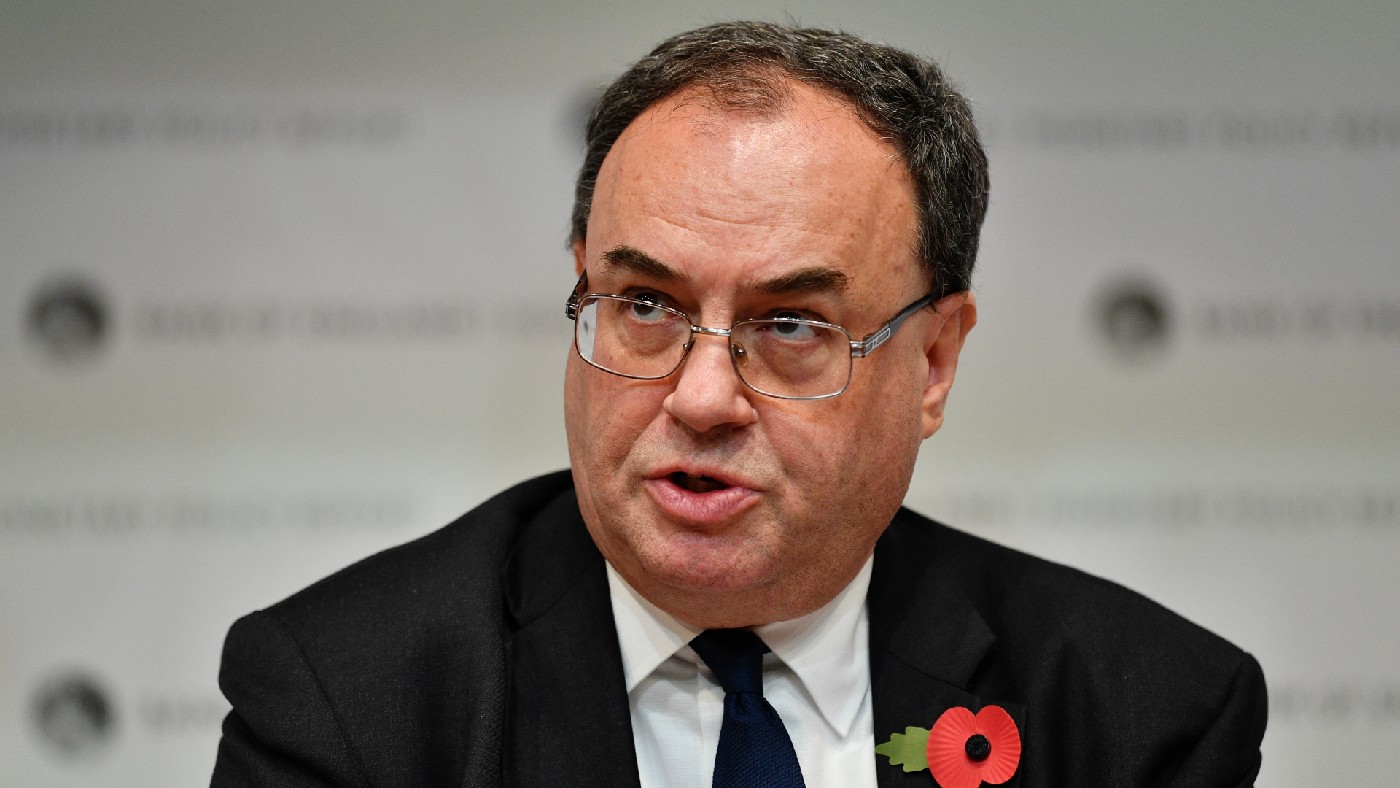The Bank of England under fire for ‘getting its forecasts badly wrong’
Soaring inflation has prompted accusations of economic mismanagement

A free daily email with the biggest news stories of the day – and the best features from TheWeek.com
You are now subscribed
Your newsletter sign-up was successful
This year marks the 25th anniversary of the Bank of England’s independence. But the celebrations may be muted in Threadneedle Street, said Russell Lynch in The Daily Telegraph. Uncomfortably for governor Andrew Bailey, the BoE’s silver jubilee coincides “with the greatest test of its credibility in a quarter of a century” – owing to an “inflationary tsunami” critics claim it failed to anticipate. Ahead of this week’s meeting, markets had priced in a 90% chance the Bank would be forced to make its first back-to-back monthly interest rate hike since 2004, taking the base rate from 0.25% to 0.5%. Many are betting on four more hikes this year. Bailey “bristled” when MPs on the Treasury Select Committee suggested he had got the “judgement call” wrong by not acting earlier. “But it is difficult to argue from a position of strength” when inflation, at 5.4%, is nearly treble the Bank’s 2% target, and could possibly run as high as 7% in April.
In fairness, Bailey wasn’t alone in failing to read the inflationary runes, said Alex Brummer in the Daily Mail. In fact, he was “the first central banker of out the blocks” – hiking rates in December when such measures are only now on the way in the US and Europe. And it isn’t really his fault that the British economy now faces a debilitating “double whammy of higher rates and higher taxes” that could knock the recovery for six; the greater blame lies with the Government’s insistence on ploughing ahead with its “fiscal squeeze”. Still, there’s no escaping the fact that the BoE has been “getting its forecasts badly wrong”, with “serious consequences for the management of economic policy”, said Andrew Sentance in The Times. The Monetary Policy Committee’s record has been “chequered” for a decade. “Diversity of debate” has faded away, communication is poor, and there’s been “no clear strategy for normalising UK monetary policy since the global financial crisis”. A “robust review” is urgently needed.
What matters most to the average Briton is what the rate rises will mean for their pockets, said Hugo Duncan in The Mail on Sunday. A hike to, say, 1.5% doesn’t sound too scary, but analysts warn it may come as “a shock” to about ten million British adults who have “never experienced base rates above 1%” – adding £1,300 a year to the cost of a typical mortgage. That’s why a more “measured” rate rise makes sense, said Chris Giles in the FT. The BoE will hope “to shock people into believing it’s serious about bringing inflation down, without having to prescribe the painful medicine of markedly higher borrowing costs”. Tricky to pull off.
The Week
Escape your echo chamber. Get the facts behind the news, plus analysis from multiple perspectives.

Sign up for The Week's Free Newsletters
From our morning news briefing to a weekly Good News Newsletter, get the best of The Week delivered directly to your inbox.
From our morning news briefing to a weekly Good News Newsletter, get the best of The Week delivered directly to your inbox.
A free daily email with the biggest news stories of the day – and the best features from TheWeek.com
-
 How the FCC’s ‘equal time’ rule works
How the FCC’s ‘equal time’ rule worksIn the Spotlight The law is at the heart of the Colbert-CBS conflict
-
 What is the endgame in the DHS shutdown?
What is the endgame in the DHS shutdown?Today’s Big Question Democrats want to rein in ICE’s immigration crackdown
-
 ‘Poor time management isn’t just an inconvenience’
‘Poor time management isn’t just an inconvenience’Instant Opinion Opinion, comment and editorials of the day
-
 Currencies: Why Trump wants a weak dollar
Currencies: Why Trump wants a weak dollarFeature The dollar has fallen 12% since Trump took office
-
 Elon Musk’s starry mega-merger
Elon Musk’s starry mega-mergerTalking Point SpaceX founder is promising investors a rocket trip to the future – and a sprawling conglomerate to boot
-
 TikTok: New owners, same risks
TikTok: New owners, same risksFeature What are Larry Ellison’s plans for TikTok US?
-
 Will SpaceX, OpenAI and Anthropic make 2026 the year of mega tech listings?
Will SpaceX, OpenAI and Anthropic make 2026 the year of mega tech listings?In Depth SpaceX float may come as soon as this year, and would be the largest IPO in history
-
 Leadership: A conspicuous silence from CEOs
Leadership: A conspicuous silence from CEOsFeature CEOs were more vocal during Trump’s first term
-
 Ryanair/SpaceX: could Musk really buy the airline?
Ryanair/SpaceX: could Musk really buy the airline?Talking Point Irish budget carrier has become embroiled in unlikely feud with the world’s wealthiest man
-
 Powell: The Fed’s last hope?
Powell: The Fed’s last hope?Feature Federal Reserve Chairman Jerome Powell fights back against President Trump's claims
-
 The end for central bank independence?
The end for central bank independence?The Explainer Trump’s war on the US Federal Reserve comes at a moment of global weakening in central bank authority